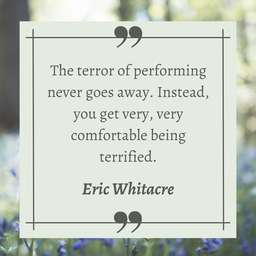
This week, I am discussing a topic that is familiar to all of us--performance anxiety. Whether we have dealt with this issue ourselves (*raises hand*), or helped our students to deal with it, it is an issue that all musicians are sure to encounter in one way or another at some point in their musical journey.
Today, I am sharing my top 5 tips for helping in the battle against performance anxiety! Keep reading for tips you can share with your students...
One of the best ways to ease performance anxiety is to make sure that you feel completely prepared for your performance. This includes:
- Choosing music early, so you have plenty of time to learn your pieces without feeling stressed.
- Setting goals in the weeks leading up to a performance so that your pieces will be polished and recital-ready on time. (See my "Recital-Ready Timeline" HERE for tips on how to do this!)
- Practicing your pieces in a variety of ways so that they stay fresh leading up to a performance. (See my article "10 Ways to Practice a Piece Before a Performance" HERE!)
- Testing your memorization (if applicable) by practicing in a variety ways to reinforce visual, aural, and kinesthetic memory of your pieces. (See my top tips for memorizing music securely, including a free memory challenge printable, HERE.)

Tip #2: Perform for others as often as possible.
Pretty much every musician I have ever met has dealt with performance anxiety in one way or another. However, the old saying is true: the more you perform, the easier it gets!
You don't have to play for a crowd of thousands to get more comfortable performing. Try these baby steps:
- Record yourself performing your pieces. This is a great way to replicate the recital experience without anyone else being in the room!
- Play for small groups of fellow students. These are "your people"--the ones who know exactly what you are going through because they are going through it, too! Help each other get better at performing by playing for each other and creating a support system as you prepare for larger performances.
- Perform for your friends and family. Choose a few of your most supportive friends or family members and invite them to listen to you. Let them be your cheerleaders as you work to get more comfortable performing for a larger audience.
- Look for casual performance opportunities. Can you play background music at your next family gathering? Or, perhaps your local nursing home has a piano and would be thrilled to have a volunteer come in and play for the residents there? Look for more casual performance opportunities that will give you experience playing for others in a relaxed environment.
Preparing for a successful performance involves mental preparation, too! There are several things you can do away from the piano to mentally prepare for your next performance:
- Focus on breathing, posture, and checking for tension at various times throughout the day. You may be surprised at how often you are tensing your shoulders, slouching, or taking shallow breaths--and these bad habits can carry over to the piano bench and increase tension and anxiety when it is time to perform.
- Do your best to avoid negative self-talk regarding your performance. For example, instead of thinking: "I'm so nervous about the recital!", try instead to think: "I am well-prepared for this recital and ready to do my very best!"
- Think through your pieces away from the piano and imagine how much you will enjoy sharing your music with the audience. You likely chose these pieces because you love to play them, so focus on making the audience feel your love and excitement for this music.
Tip #4: Plan stress-reducing activities in the hours leading up to a performance.
On the day of your performance, there are several things you can do to help ease your anxiety:
- Try gentle exercise, like walking, stretching, or yoga. These activities can help get out your nervous energy and release tension.
- Get a good night's sleep and plan on arriving to the recital venue early so you don't feel rushed. This will also give a chance to see the layout of the stage and to take a look at the program so you know what to expect before you perform.
- Remember to take deep breaths and focus on that positive self-talk before you go on stage to perform. You are prepared, you are excited to play--you got this!
Tip #5: After a performance, celebrate your achievement and move on.
Congratulations--you did it! Now is the time to celebrate your hard work and to tell yourself how proud you are for getting out there and performing your pieces. Don't dwell on things that you weren't happy about in your performance right now. Focus on what you did well and accept the congratulations of your friends and family.
Once some time has passed and you can be objective about your performance, you might think about things you learned and things that you would do differently next time. Every performance is a learning experience, and you can apply what you learned from this performance to make the next one even better!
What do you think? Do you experience performance anxiety? Are there any tips that you would add to this list? I would love to hear from you in the comments!

 RSS Feed
RSS Feed